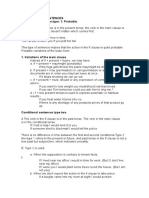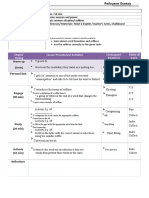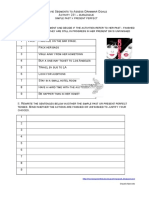Causative Form of Have and Get
Causative Form of Have and Get
Uploaded by
LucasKatzCopyright:
Available Formats
Causative Form of Have and Get
Causative Form of Have and Get
Uploaded by
LucasKatzOriginal Description:
Copyright
Available Formats
Share this document
Did you find this document useful?
Is this content inappropriate?
Copyright:
Available Formats
Causative Form of Have and Get
Causative Form of Have and Get
Uploaded by
LucasKatzCopyright:
Available Formats
Causative form of have and get
We use a causative verb when we want to talk about something that someone else did for
us or for another person. It means that the subject caused the action to happen, but didn't
do it themselves. Maybe they paid, or asked, or persuaded the other person to do it. For
example, we can say:
I cleaned my house. (This means I cleaned it myself).
If I paid someone to clean it, of course I can say:
A cleaner cleaned my house.
But, another way is to use a causative construction. So I can also say:
I had my house cleaned.
In a sense, using a causative verb is similar to using a passive. The important thing is that
the house is now clean. We don't focus on who did the cleaning.
Have + object + past participle (have something done)
We usually use 'have something done' when we are talking about paying someone to do
something for us. It's often used for services. The form is 'subject + have + object + past
participle'.
I had my car washed.
John will have his house painted.
Get + object + past participle (get something done)
We can also use 'subject + get + object + past participle'. This has the same meaning as
'have', but is less formal.
The students get their essays checked.
I'll get my hair cut next week.
He got his washing machine fixed.
Have someone do something (have + person + infinitive)
We can also use the construction 'subject + have + person + infinitive'. This has a very
similar meaning to 'have something done', which we've already talked about, but this time
we say who did the thing - we talk about the person who we asked to do the thing for us.
I had the electrician look at my broken light.
The doctor will have the nurse call the patients.
The teacher had the students write the answers on the whiteboard.
Get someone to do something (get + person + to + infinitive)
Finally, we can also use the construction 'get + someone + to + infinitive'. Again, this
means that you cause the other person to do the action, maybe by paying them to do it, or
by asking them to do it, or by persuading them to do it.
She gets her son to do his homework by promising him ice cream when he's finished.
I got the cleaner to clean under the cupboards.
Sometimes, this construction has the feeling that we needed to convince someone to do
something, while the other constructions on this page are neutral.
You might also like
- B. Lowe Yolngu DictionaryDocument201 pagesB. Lowe Yolngu Dictionaryhotelonpicadilly100% (1)
- Module - Grade 8 English - Parallel StructuresDocument3 pagesModule - Grade 8 English - Parallel StructuresPax Garcia50% (4)
- Features of Writing - Part 2Document20 pagesFeatures of Writing - Part 2Uang KejuNo ratings yet
- Would Rather Would SoonerDocument2 pagesWould Rather Would SoonerTanya PribylevaNo ratings yet
- Mixed ConditionalsDocument4 pagesMixed Conditionalsgabrielgarcia861621100% (1)
- Ways of Expressing FutureDocument6 pagesWays of Expressing FutureAdriana DragusNo ratings yet
- Causative VerbsDocument9 pagesCausative VerbsRia Yulianti Toelle100% (1)
- A2.1 Gerunds and InfinitivesDocument4 pagesA2.1 Gerunds and InfinitivespjposullivanNo ratings yet
- Past Continuous Tense Grammar GuidesDocument1 pagePast Continuous Tense Grammar GuidesChristopher SmithNo ratings yet
- If ConditionalDocument17 pagesIf ConditionalBella FitriyaniNo ratings yet
- FUTURE in The PASTDocument2 pagesFUTURE in The PASTAnca AvadaneiNo ratings yet
- Transformations Revision: Name: . Class: Date: GradeDocument9 pagesTransformations Revision: Name: . Class: Date: GradeCarlosNo ratings yet
- Pronumele RelativDocument2 pagesPronumele RelativLacraNo ratings yet
- Past ContinuousDocument5 pagesPast ContinuousJair MolinaNo ratings yet
- B2 - Third Conditionals and Mixed ConditionalsDocument3 pagesB2 - Third Conditionals and Mixed Conditionalscmooreruiz18No ratings yet
- Unreal PastDocument4 pagesUnreal PastMarija Mihailova100% (1)
- Conditionals Sentences ExplanationDocument2 pagesConditionals Sentences ExplanationerasetNo ratings yet
- Past Simple Vs Past ContinuousDocument3 pagesPast Simple Vs Past ContinuousVasilencu SorinNo ratings yet
- Conditional and WishDocument2 pagesConditional and Wishfatima ikenNo ratings yet
- Impersonal PassiveDocument6 pagesImpersonal Passiveandreeagabriela28No ratings yet
- Past Simple TenseDocument4 pagesPast Simple Tenseapi-304729893No ratings yet
- Time ClausesDocument3 pagesTime Clausesmarcoantoniocasanova100% (2)
- Reported SpeechDocument4 pagesReported SpeechnataNo ratings yet
- Past Perfect Continuous ExercisesDocument2 pagesPast Perfect Continuous ExercisesRaúl Díaz ZárateNo ratings yet
- How To Write An EmailDocument3 pagesHow To Write An EmailBeatriz PNo ratings yet
- HypothesizingDocument2 pagesHypothesizingArba NikqiNo ratings yet
- Mixed-Conditionals TableDocument1 pageMixed-Conditionals TableZouzou ChibouniNo ratings yet
- Be Able ToDocument5 pagesBe Able ToMarcosTupiaAronesNo ratings yet
- Have and Get Something DoneDocument4 pagesHave and Get Something Donelaia_comellasNo ratings yet
- Subject Vs Object QuestionsDocument1 pageSubject Vs Object QuestionsAdrian OchoaNo ratings yet
- Possessive Nouns: by Ms. Adams Revised by Mr. CDocument25 pagesPossessive Nouns: by Ms. Adams Revised by Mr. CRonnaliza CorpinNo ratings yet
- Reported Speech TheoryDocument4 pagesReported Speech TheoryanabelvilchesNo ratings yet
- Model Test Bilingv 1Document3 pagesModel Test Bilingv 1Ioana Ionescu100% (1)
- Theory - I Wish - If OnlyDocument1 pageTheory - I Wish - If OnlylamanandaNo ratings yet
- Conditionals 2 3Document12 pagesConditionals 2 3LauGalindoNo ratings yet
- 2 Bac Women and Power Vocabulary SuffixesDocument1 page2 Bac Women and Power Vocabulary Suffixesenglish classNo ratings yet
- Some Grammars Say "Get" Is Just More Informal Than "Have" in The Causative Form. in InformalDocument5 pagesSome Grammars Say "Get" Is Just More Informal Than "Have" in The Causative Form. in InformalhezielnuezNo ratings yet
- Conditional Sentences ( If"sentences)Document3 pagesConditional Sentences ( If"sentences)Anonymous k2K2AFFw100% (1)
- Modals: FinitenessDocument16 pagesModals: Finitenesshesvi dwi95No ratings yet
- Unit 8: Hypothetical or Imaginary Situations.: Form 1Document4 pagesUnit 8: Hypothetical or Imaginary Situations.: Form 1Emely Gabriela FNo ratings yet
- Wish-If Only WorksheetDocument3 pagesWish-If Only WorksheetBravo Brabvo100% (1)
- Subject and Object QuestionsDocument3 pagesSubject and Object QuestionsMila MILANo ratings yet
- Used To, Get Used To, Be Used ToDocument2 pagesUsed To, Get Used To, Be Used ToTue Anh NguyenNo ratings yet
- 1.a.IF-CLAUSES (0,1,2,3.types) - 2-2Document2 pages1.a.IF-CLAUSES (0,1,2,3.types) - 2-2joanaNo ratings yet
- Grammar. Passive VoiceDocument1 pageGrammar. Passive VoiceMed MouminNo ratings yet
- Choose The Most Suitable Word or Phrase.: Exercises (" Wish" Clause)Document2 pagesChoose The Most Suitable Word or Phrase.: Exercises (" Wish" Clause)Diệu HằngNo ratings yet
- Personal Pronouns, Possessive AdjectivesDocument3 pagesPersonal Pronouns, Possessive AdjectivesRaquel Dias LuísNo ratings yet
- Conditional InverrsionDocument1 pageConditional InverrsionasliNo ratings yet
- Question Words ExercisesDocument1 pageQuestion Words ExercisesBruna MolinaNo ratings yet
- Present Perfect ContinuousDocument5 pagesPresent Perfect ContinuousKrishna PrasadNo ratings yet
- PREFER Would RatherDocument2 pagesPREFER Would RatherMariana100% (1)
- CausativeDocument11 pagesCausativeAbdullah Aziz AlaikaNo ratings yet
- Unreal PastDocument4 pagesUnreal PastPatricia CopelloNo ratings yet
- Class 7 - Comparative and Superlative AdjectivesDocument3 pagesClass 7 - Comparative and Superlative AdjectivesAnthony C.A.100% (1)
- Question Tag Worksheet WAKDocument2 pagesQuestion Tag Worksheet WAKAna Angeleska-SpiroskaNo ratings yet
- Future in The PastDocument6 pagesFuture in The PastGaukhar ZeinetullaNo ratings yet
- Preterite V ImperfectDocument1 pagePreterite V ImperfectJoaquinNo ratings yet
- Zero - First - Second ConditionalDocument2 pagesZero - First - Second ConditionalKarmen ŽnidaršičNo ratings yet
- Future Perfect: Exercise 1: Fill in The Verbs in Brackets in The Future PerfectDocument3 pagesFuture Perfect: Exercise 1: Fill in The Verbs in Brackets in The Future PerfectQuynh Thy Nguyen67% (3)
- Ending A Sentence With A PrepositionDocument2 pagesEnding A Sentence With A PrepositionKez MaxNo ratings yet
- Christmas Vocabulary Missing Letters in Words Esl WorksheetDocument2 pagesChristmas Vocabulary Missing Letters in Words Esl WorksheetVarvara MarkoulakiNo ratings yet
- Grammar: Causative FormDocument2 pagesGrammar: Causative FormshuevinNo ratings yet
- How To Conjugate Verbs in Moroccan ArabicDocument53 pagesHow To Conjugate Verbs in Moroccan Arabicعبد الجبار توفيق الله100% (9)
- Articles: The RainDocument2 pagesArticles: The RainahokongNo ratings yet
- Practice Test PrepaDocument5 pagesPractice Test Prepagiscarrillo15No ratings yet
- Modul 12: Couldn't Chew Anything. (This Adverb Clause Describes Why I Had A Milkshake ForDocument4 pagesModul 12: Couldn't Chew Anything. (This Adverb Clause Describes Why I Had A Milkshake ForChaerunnisa100% (1)
- 2022-2 2nd Sem Set of Evidences # 1.3Document5 pages2022-2 2nd Sem Set of Evidences # 1.32IV12.Aparicio Cerecedo Miguel AngelNo ratings yet
- Basic Rules For Gerunds and Infinitives - TRU NewsroomDocument1 pageBasic Rules For Gerunds and Infinitives - TRU NewsroomzehraNo ratings yet
- Unit 1Document16 pagesUnit 1Eka Valciana MimiNo ratings yet
- Example: The First Guests Were Donna and I. I, Nominative, 6 Example: The First Guests Were Donna and I. I, Nominative, 6Document1 pageExample: The First Guests Were Donna and I. I, Nominative, 6 Example: The First Guests Were Donna and I. I, Nominative, 6Mjoy PadayaoNo ratings yet
- Sentence Analysis WorksheetDocument1 pageSentence Analysis Worksheetjbohm65No ratings yet
- English Midterm 3Document7 pagesEnglish Midterm 3Lyn MagdaraogNo ratings yet
- Korean Frequency DictionaryDocument359 pagesKorean Frequency DictionaryMathew NedelkaNo ratings yet
- Foreign Words in EnglishDocument2 pagesForeign Words in EnglishJelena JelenaNo ratings yet
- Future Tense Group 5.0Document21 pagesFuture Tense Group 5.0Nur atika YahyaNo ratings yet
- Ejercicios On Line Preparación PETDocument3 pagesEjercicios On Line Preparación PETidrollNo ratings yet
- Verb To Be ExerciciosDocument1 pageVerb To Be ExerciciosIsis Da Costa BarretoNo ratings yet
- The Eight Parts of SpeechDocument6 pagesThe Eight Parts of SpeechJane JumawanNo ratings yet
- ENG6M6Q4Document8 pagesENG6M6Q4Ma. Rosa AtotuboNo ratings yet
- 1.structural GrammarDocument14 pages1.structural GrammarRansel Burgos100% (1)
- All About: 5 Most Important Phrases For Learning Portuguese!Document3 pagesAll About: 5 Most Important Phrases For Learning Portuguese!Luiz Carlos Almeida TellesNo ratings yet
- English Passive VoiceDocument32 pagesEnglish Passive VoiceYuka SetianaNo ratings yet
- Quantifiers-A2Document3 pagesQuantifiers-A2linaNo ratings yet
- Ielts - Lesson 8Document5 pagesIelts - Lesson 8dovi01No ratings yet
- American Headway 3: Unit 4Document22 pagesAmerican Headway 3: Unit 4JuanaNo ratings yet
- 231 Burlesque - Simple Past X Present PerfectDocument3 pages231 Burlesque - Simple Past X Present PerfectOmar Gabriel RGNo ratings yet
- تجميعات وتدريبات الانجليزي ارامكو نهضة المستقبلDocument269 pagesتجميعات وتدريبات الانجليزي ارامكو نهضة المستقبلBlink SNo ratings yet
- MT Spanish Builder (Eng Only)Document16 pagesMT Spanish Builder (Eng Only)krstas774No ratings yet
- To BeDocument7 pagesTo BeSamuel Celedonio RodriguezNo ratings yet
- Writing 1 Complex SentenceDocument21 pagesWriting 1 Complex SentenceRe BaladastraNo ratings yet

























































































